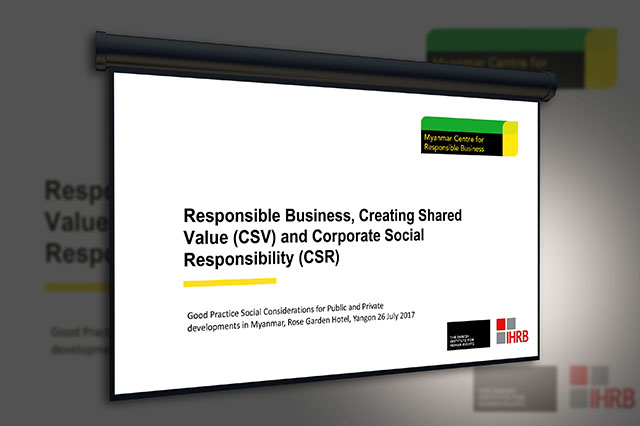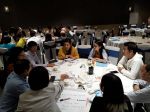Responsible Business and CSR: What Matters is Not ‘How Much?’ but ‘How’?

Vicky Bowman spoke about responsible business conduct, corporate social responsibility (CSR), creating shared value (CSV) and building a social licence to operate at a two-day seminar on ‘Good Practice Social Considerations for Public and Private Developments’ organised by the Japanese International Cooperation Agency (JICA) at Rose Garden Hotel, Yangon on 26/27 July 2017.
The seminar was attended by around 60 participants including government officials from Yangon Regional Government, Yangon City Development Committee, Myanmar Railways, Environmental Conservation Department, as well as members of the management committees of Thilawa, Dawei and Kyaukphyu Special Economic Zones, the Thilawa SEZ ‘One-Stop Shop’ (OSS), local NLD representatives from Kyauktan and Thanlyin, consultants, NGOs and members of the local community.
Vicky’s presentation focussed on distinguishing between the voluntary and obligatory aspects of responsible business conduct.
The obligatory or ‘compliance’ aspects include the actions a company was required by law to undertake, such as obeying national laws and mitigating the social and environmental impacts its business was causing. These impacts, and mitigation actions – which could have a cost - might be identified through an Environmental Impact Assessment (EIA) process and included in an Environmental Management Plan as legal commitments.
Vicky invited participants to distinguish between what a company was required to do, and the additional, voluntary activities which a company chose to do to be more responsible. These voluntary activities might either be connected to, and beneficial for the business. They might help the business to save money through lower energy or water bills, or create new sources of profit. Activities of this sort could be termed ‘creating shared value’ or ‘sustainability’. In addition to saving or making money, if effectively communicated, they would enhance a company’s reputation and ‘social licence to operate’ by demonstrating the company’s commitment to addressing wider social and environmental issues.
Examples from Myanmar were given, some of them drawing on the Australia Myanmar Chamber of Commerce (AMCC) position paper on ‘Incentivising Shared Value’ which was published in 2016 by the AMCC Responsible Investment Working Group which MCRB co-chairs.
Voluntary activities might be philanthropic, and not connected directly to business activity, such as sponsoring sports and community events. However companies or government should not argue that voluntary activities could act as an ‘offset’ for failure to address negative impacts of the company’s activity. Negative impacts should always be addressed, and any true ‘offsets’ – for example to replace or protect equivalent biodiversity areas damaged by the company – should be legally binding commitments.
It was pointed out that in Myanmar, as elsewhere, sponsorships also had a business benefit. MCRB finds in straw polls at workshops that when it asks ‘Which are the most responsible companies in Myanmar?’ participants often respond with names of companies who invest in donations and sponsorships. Sponsorships therefore build a company’s brand, and contribute to its reputation and social licence to operate.
But this demonstrates another point. Sponsorships could be seen as marketing expenditure. This shows that it is often difficult to separate out spending on ‘CSR’ – whether it be sponsorships, increased sustainability, or activities to create shared value - from core business spending. For this reason, an emphasis on ‘how much will the company spend on CSR?’ was less helpful than ‘how will the company be responsible and create shared value?” The AMCC report recommended that the Myanmar government focus on asking this question.
Also highlighted as a reason for concern about a ‘how much?’/spending focus were MCRB’s findings from research on how ‘CSR budgets’ or ‘donations’ could be misused in Myanmar. For example local mining company ‘CSR budgets’ were found to be used for regular payments to local officials, and requests for bribes were portrayed by officials as ‘donations’ to departmental funds.
The presentation also touched on the importance of due diligence and continuous stakeholder consultation and communication. This was important to ensure that further social investment is successful, appreciated and ‘does no harm’. It was also essential to successfully identify and mitigate a company’s impacts in its sphere of influence. These messages of participation and continuous two-way communication were also repeated in the other expert presentations in the workshop on assessing social impacts, resettlement and complaints and grievance handling, and lessons learned from Thilawa SEZ.
ဆက္စပ္ေသာ အေၾကာင္းအရာ
Share:

 English
English မြန်မာ
မြန်မာ မြန်မာ (unicode)
မြန်မာ (unicode)









